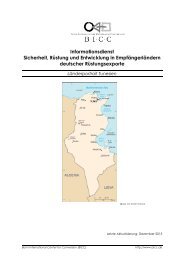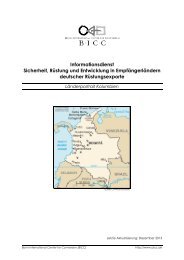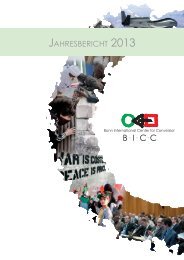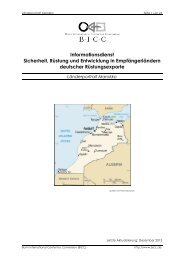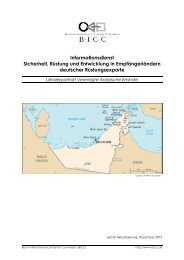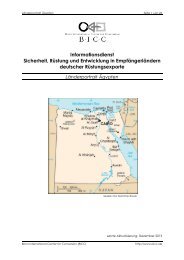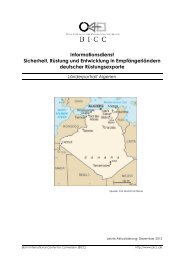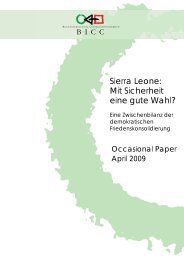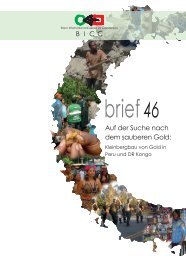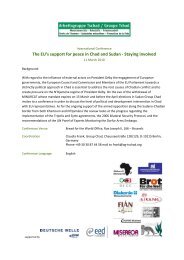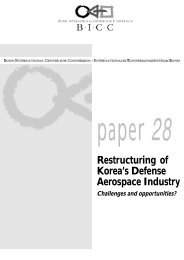English - BICC
English - BICC
English - BICC
Create successful ePaper yourself
Turn your PDF publications into a flip-book with our unique Google optimized e-Paper software.
negotiations made it “impossible for<br />
any agreement to be reached without<br />
the positive support of parties<br />
representing majorities in each main<br />
part of the community” and<br />
underlined their belief that progress on<br />
decommissioning in parallel with<br />
substantive political talks would lead to<br />
a “benign dynamic” of growing<br />
confidence and a mutually acceptable<br />
outcome (Belfast Telegraph, 17 July<br />
1997).<br />
The British government had already<br />
been at work in trying to build<br />
Republican trust by effectively<br />
removing the decommissioning issue as<br />
a possible block in inter-party<br />
negotiations. On the 8 July 1997, Blair<br />
sent a letter to Martin McGuinness<br />
stating his commitment to moving as<br />
“rapidly as possible to an agreed<br />
political settlement”. “The situation in<br />
Northern Ireland means that delay is<br />
not acceptable”, he wrote. It was not<br />
necessary for the IRA to hand in<br />
weaponry in order to keep Sinn Fein in<br />
the process as “the only ground for<br />
exclusion once a party has joined the<br />
negotiations” was a dishonouring of<br />
the Mitchell Principles on non-violence<br />
(Irish Times, 18 July 1997).<br />
IRA ceasefire<br />
reinstated<br />
This commitment from the British<br />
successfully secured a reinstatement of<br />
the IRA ceasefire on the 19 July.<br />
Unionism reacted with rage, and the<br />
DUP and the smaller United Kingdom<br />
Unionist Party withdrew permanently<br />
from the talks process. Although<br />
unhappy with the governments’<br />
position, the Ulster Unionists took a<br />
more pragmatic approach; as one<br />
negotiator commented: “The IRA has<br />
called a tactical ceasefire, so we should<br />
engage in tactical talks” (Irish Times, 26<br />
September 1997). The Ulster Unionists<br />
thus engaged in only indirect contact<br />
with Sinn Fein during the talks in order<br />
to insulate themselves from criticism.<br />
Despite the lack of decommissioned<br />
weaponry, walking away from<br />
negotiations was judged to be a risky<br />
venture which would portray Unionism<br />
as the spoiler of hopes for peace, and<br />
weaken Unionist input. The Union<br />
could not be defended “long distance”<br />
(Irish Times, 26 September 1997).<br />
Sinn Fein duly signed up to the<br />
Mitchell Principles on non-violence in<br />
September and gained admittance to<br />
the talks process. Comforting language<br />
for Unionism came in the form of a<br />
joint declaration by the British and<br />
Irish governments that<br />
decommissioning was an<br />
“indispensable part of the<br />
negotiation”, a phrase which resurfaced<br />
in an agreed procedural motion at the<br />
all-party talks which opened the way to<br />
substantive constitutional negotiations<br />
(Irish Times, 16 September 1997, 26<br />
September 1997). Yet a substantial<br />
question mark hung over Republican<br />
intent; the IRA made clear that it<br />
would have “problems with sections of<br />
the Mitchell Principles” and concluded<br />
that “decommissioning on our part<br />
would be tantamount to surrender”. To<br />
the IRA, questions about disarmament<br />
led up a blind alley and smacked of<br />
bad faith as “those with a genuine<br />
interest in developing a peace process<br />
which has the potential for producing a<br />
just and lasting peace will have no<br />
interest in decommissioning beyond<br />
the point where all guns are silent”<br />
(Irish Times, 12 September 1997).<br />
The Independent<br />
International<br />
Commission on<br />
Decommissioning<br />
(IICD)<br />
If that was the case, what was to be the<br />
point of the Independent International<br />
Commission on Decommissioning<br />
(IICD), instituted a matter of weeks<br />
later? The Commission included<br />
commissioners from the same three<br />
nations involved in the International<br />
Body, General John de Chastelain from<br />
B·I·C·C<br />
run-up to the agreement<br />
Canada, as Chairman, Brigadier Tauno<br />
Nieminen from Finland, and Mr.<br />
Andrew Sens from the United States.<br />
The IICD had been tasked, in line with<br />
the British and Irish Agreement of<br />
June, to facilitate the process of the<br />
destruction of arms and to liase with<br />
the subcommittee on decommissioning<br />
at the negotiations.<br />
It is significant that no clear agreement<br />
on the question of decommissioning<br />
was reached at the otherwise<br />
successfully concluded negotiations. As<br />
one commentator has emphasised, the<br />
decommissioning issue was not an<br />
important focus within the talks<br />
proper, indeed it was “submerged in<br />
the sub-committees—literally parked”<br />
(Mac Ginty, 1998, pp. 40–41). In terms<br />
of decommissioning, what the talks<br />
participants agreed to was a fudge: the<br />
key paragraph relating to<br />
decommissioning in the Belfast<br />
Agreement of April 1998 simply stated<br />
that the negotiators affirmed their<br />
commitment to paramilitary<br />
disarmament and would use their<br />
influence to achieve decommissioning<br />
within two years (see Box B for the<br />
decommissioning clause in the Agreement).<br />
The IICD would however act in<br />
support of this and its mandate<br />
enabled it, inter alia, to consult with the<br />
governments, paramilitary<br />
representatives and the political parties,<br />
present proposals and reports relevant<br />
to decommissioning, and monitor and<br />
verify the actual decommissioning of<br />
weaponry (see Agreement on the<br />
Independent International<br />
Commission on Decommissioning, 26<br />
August 1997 at http://cain.ulst.ac.uk/<br />
events/peace/docs/dec26897.htm).<br />
Further to this, on 30 June the two<br />
decommissioning schemes (as set out<br />
in the British and Irish<br />
Decommissioning Acts of 1997) came<br />
into effect, allowing the disposal of<br />
weaponry to be undertaken either by<br />
the Commission or by the<br />
paramilitaries themselves. The schemes<br />
prohibited the forensic examination of<br />
armaments, and rendered them<br />
inadmissible as evidence in court (Irish<br />
Times, 30 June 1998). There were no<br />
explicit timetables or definite<br />
guarantees that disarmament would<br />
25



